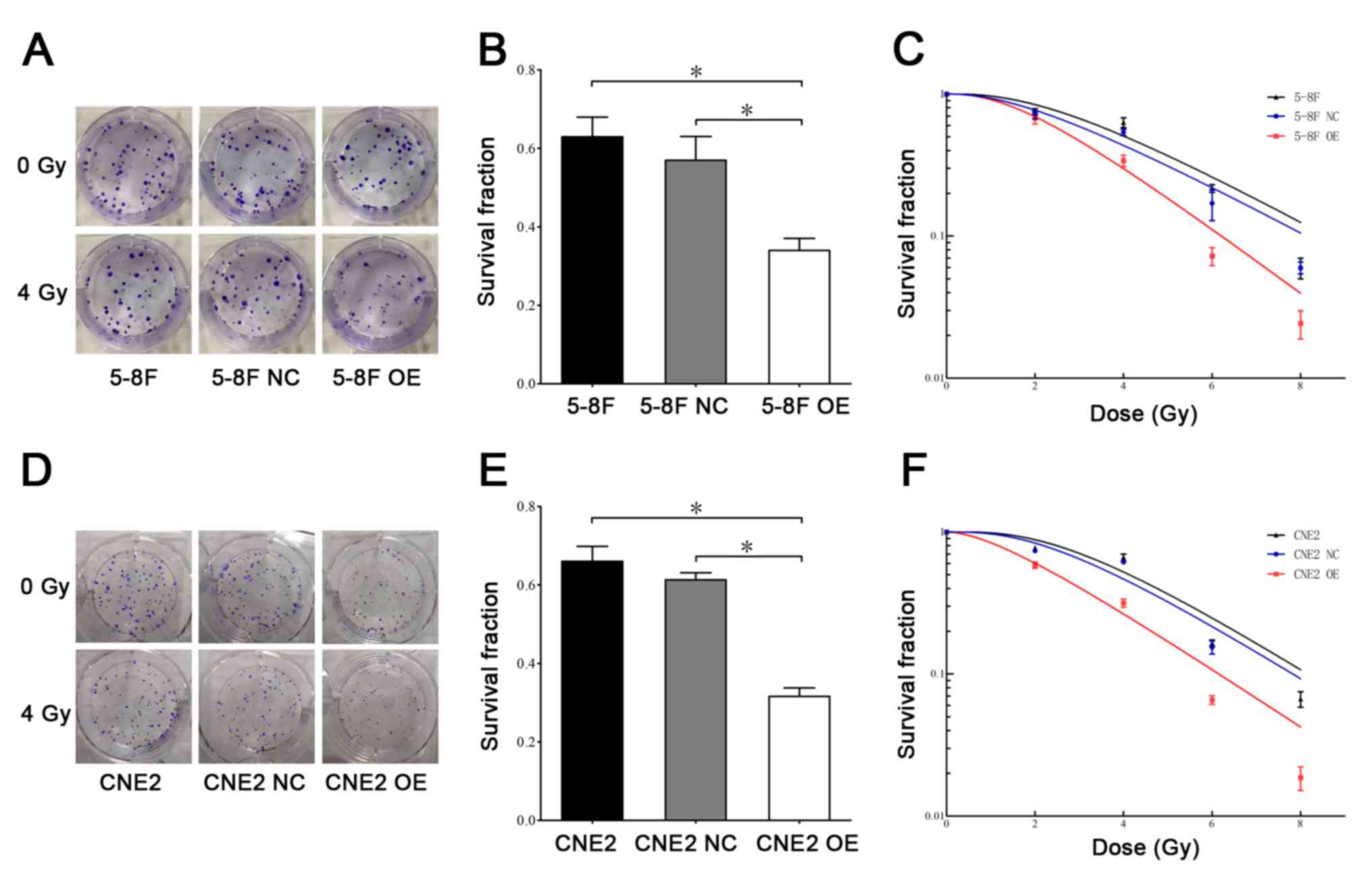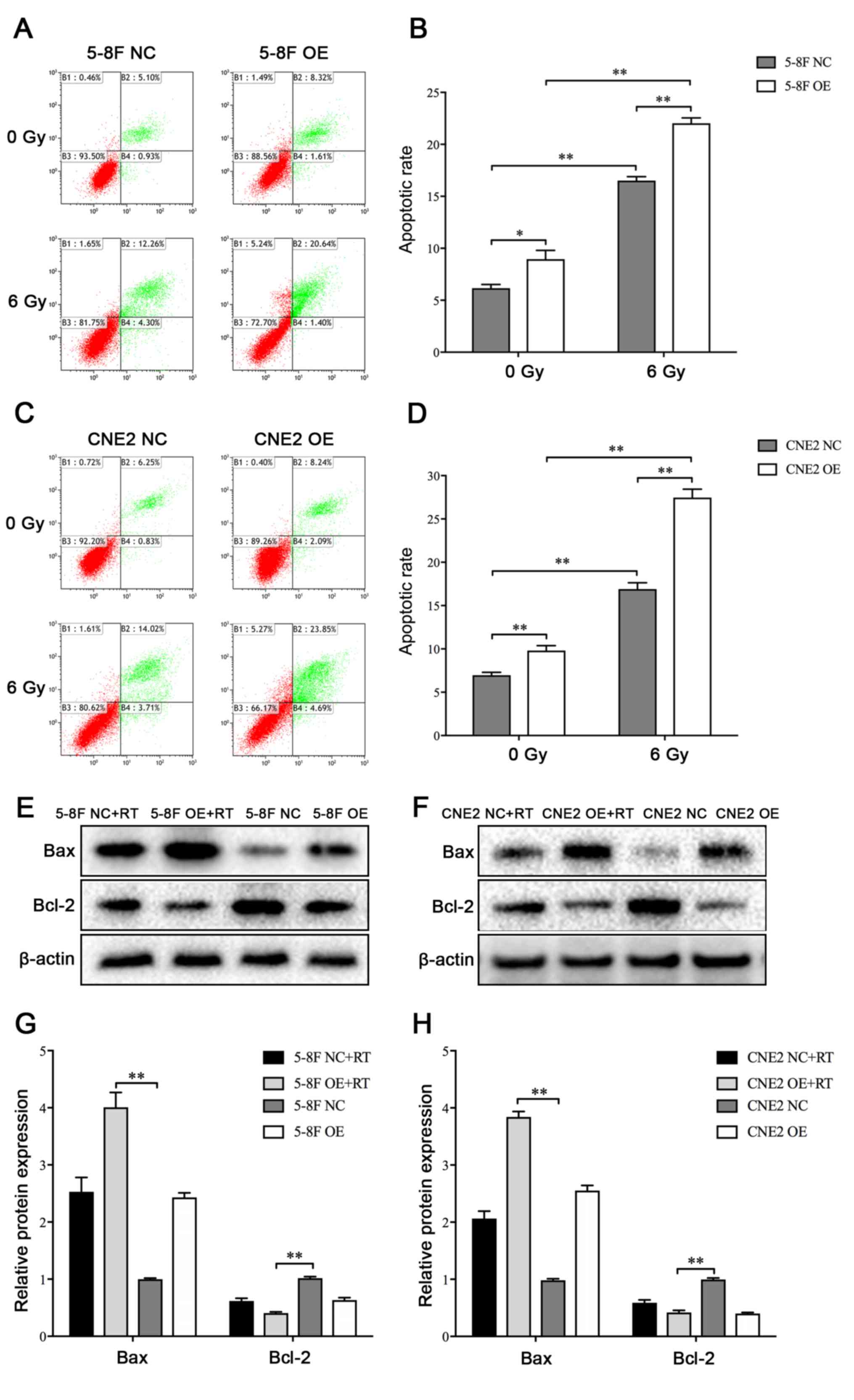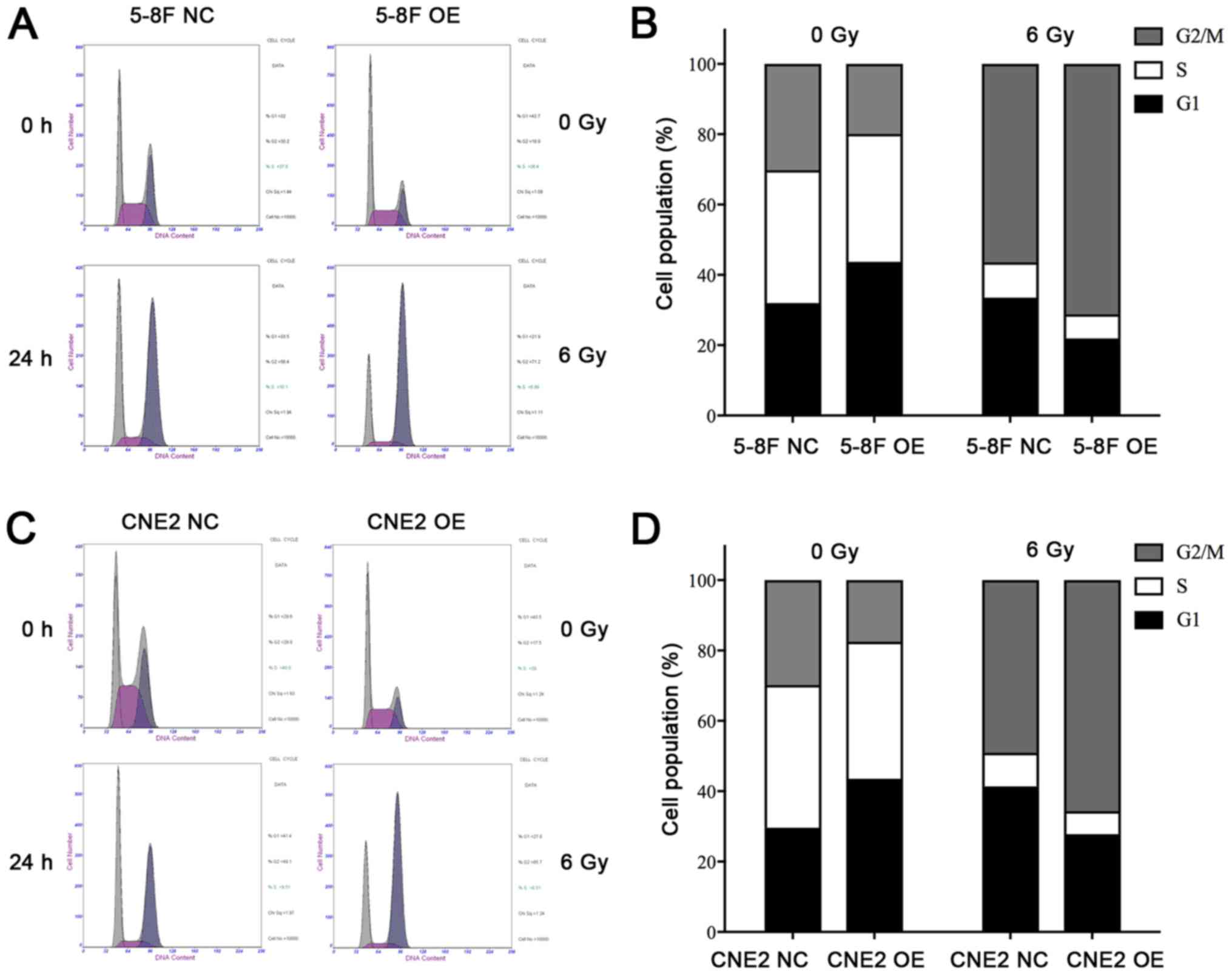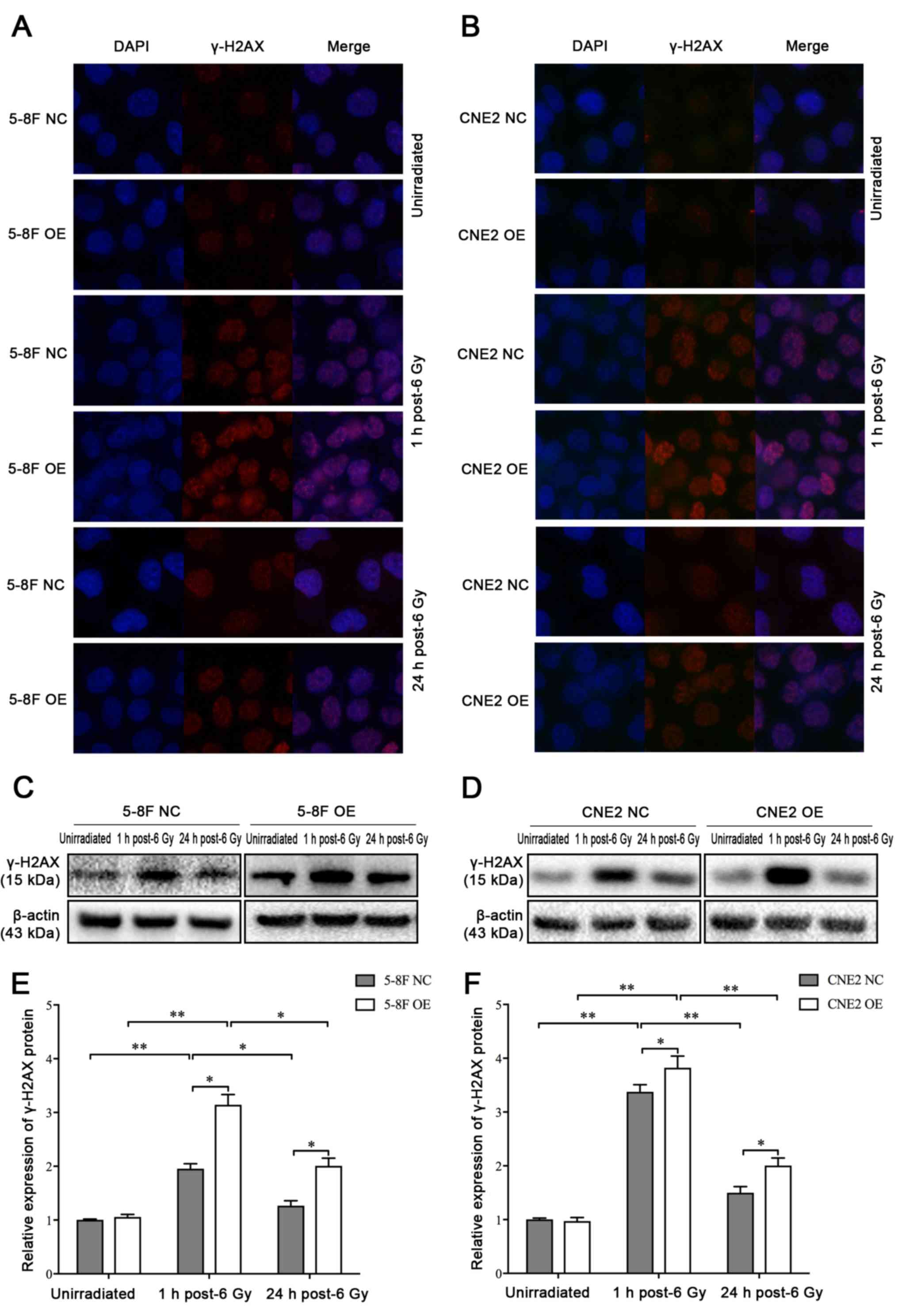|
1
|
Zhang L, Huang Y, Hong S, Yang Y, Yu G,
Jia J, Peng P, Wu X, Lin Q, Xi X, et al: Gemcitabine plus cisplatin
versus fluorouracil plus cisplatin in recurrent or metastatic
nasopharyngeal carcinoma: A multicentre, randomised, open-label,
phase 3 trial. Lancet. 388:1883–1892. 2016. View Article : Google Scholar : PubMed/NCBI
|
|
2
|
Wang S, Pan Y, Zhang R, Xu T, Wu W, Zhang
R, Wang C, Huang H, Calin CA, Yang H and Claret FX: Hsa-miR-24-3p
increases nasopharyngeal carcinoma radiosensitivity by targeting
both the 3′UTR and 5′UTR of Jab1/CSN5. Oncogene. 35:6096–6108.
2016. View Article : Google Scholar : PubMed/NCBI
|
|
3
|
Song F, Zhang L, Ji P, Zheng H, Zhao Y,
Zhang W and Chen K: Altered expression and loss of heterozygosity
of the migration and invasion inhibitory protein (MIIP) gene in
breast cancer. Oncol Rep. 33:2771–2778. 2015. View Article : Google Scholar : PubMed/NCBI
|
|
4
|
Wang Y, Hu L, Ji P, Teng F, Tian W, Liu Y,
Cogdell D, Liu J, Sood AK, Broaddus R, et al: MIIP remodels
Rac1-mediated cytoskeleton structure in suppression of endometrial
cancer metastasis. J Hematol Oncol. 9:1122016. View Article : Google Scholar : PubMed/NCBI
|
|
5
|
Wen J, Fu J, Ling Y and Zhang W: MIIP
accelerates epidermal growth factor receptor protein turnover and
attenuates proliferation in non-small cell lung cancer. Oncotarget.
7:9118–9134. 2016. View Article : Google Scholar : PubMed/NCBI
|
|
6
|
Song SW, Fuller GN, Khan A, Kong S, Shen
W, Taylor E, Ramdas L, Lang FF and Zhang W: IIp45, an insulin-like
growth factor binding protein 2 (IGFBP-2) binding protein,
antagonizes IGFBP-2 stimulation of glioma cell invasion. Proc Natl
Acad Sci USA. 100:13970–13975. 2003. View Article : Google Scholar : PubMed/NCBI
|
|
7
|
Song F, Ji P, Zheng H, Song F, Wang Y, Hao
X, Wei Q, Zhang W and Chen K: Definition of a functional single
nucleotide polymorphism in the cell migration inhibitory gene MIIP
that affects the risk of breast cancer. Cancer Res. 70:1024–1032.
2010. View Article : Google Scholar : PubMed/NCBI
|
|
8
|
Gibbs M, Stanford JL, McIndoe RA, Jarvik
GP, Kolb S, Goode EL, Chakrabarti L, Schuster EF, Buckley VA,
Miller EL, et al: Evidence for a rare prostate
cancer-susceptibility locus at chromosome 1p36. Am J Hum Genet.
64:776–787. 1999. View
Article : Google Scholar : PubMed/NCBI
|
|
9
|
Choma MK, Lumb J, Kozik P and Robinson MS:
A genome-wide screen for machinery involved in downregulation of
MHC class I by HIV-1 Nef. PLoS One. 10:e01404042015. View Article : Google Scholar : PubMed/NCBI
|
|
10
|
Fujita T, Igarashi J, Okawa ER, Gotoh T,
Manne J, Kolla V, Kim J, Zhao H, Pawel BR, London WB, et al: CHD5,
a tumor suppressor gene deleted from 1p36.31 in neuroblastomas. J
Natl Cancer Institute. 100:940–949. 2008. View Article : Google Scholar
|
|
11
|
Shao JY, Wang HY, Huang XM, Feng QS, Huang
P, Feng BJ, Huang LX, Yu XJ, Li JT, Hu LF, et al: Genome-wide
allelotype analysis of sporadic primary nasopharyngeal carcinoma
from southern China. Int J Oncol. 17:1267–1275. 2000.PubMed/NCBI
|
|
12
|
Huang B, Zhang L, Yan J, Liang Q and Fang
Y: Fine mapping of the loss of heterozygosity for chromosome
1pter-p36.11 in nasopharyngeal carcinoma. Zhonghua Bing Li Xue Za
Zhi. 30:110–113. 2001.(In Chinese). PubMed/NCBI
|
|
13
|
Shao JY, Huang XM, Yu XJ, Huang LX, Wu QL,
Xia JC, Wang HY, Feng QS, Ren ZF, Ernberg I, et al: Loss of
heterozygosity and its correlation with clinical outcome and
Epstein-Barr virus infection in nasopharyngeal carcinoma.
Anticancer Res. 21:3021–3029. 2001.PubMed/NCBI
|
|
14
|
Rogakou EP, Pilch DR, Orr AH, Ivanova VS
and Bonner WM: DNA double-stranded breaks induce histone H2AX
phosphorylation on serine 139. J Biol Chem. 273:5858–5868. 1998.
View Article : Google Scholar : PubMed/NCBI
|
|
15
|
Downs JA, Lowndes NF and Jackson SP: A
role for Saccharomyces cerevisiae histone H2A in DNA repair.
Nature. 408:1001–1004. 2000. View
Article : Google Scholar : PubMed/NCBI
|
|
16
|
Foster ER and Downs JA: Histone H2A
phosphorylation in DNA double-strand break repair. FEBS J.
272:3231–3240. 2005. View Article : Google Scholar : PubMed/NCBI
|
|
17
|
Celeste A, Difilippantonio S,
Difilippantonio MJ, Fernandez-Capetillo O, Pilch DR, Sedelnikova
OA, Eckhaus M, Ried T, Bonner WM and Nussenzweig A: H2AX
haploinsufficiency modifies genomic stability and tumor
susceptibility. Cell. 114:371–383. 2003. View Article : Google Scholar : PubMed/NCBI
|
|
18
|
Berkovich E, Monnat RJ Jr and Kastan MB:
Roles of ATM and NBS1 in chromatin structure modulation and DNA
double-strand break repair. Nat Cell Biol. 9:683–690. 2007.
View Article : Google Scholar : PubMed/NCBI
|
|
19
|
Strong MJ, Baddoo M, Nanbo A, Xu M,
Puetter A and Lin Z: Comprehensive high-throughput RNA sequencing
analysis reveals contamination of multiple nasopharyngeal carcinoma
cell lines with HeLa cell genomes. J Virol. 88:10696–10704. 2014.
View Article : Google Scholar : PubMed/NCBI
|
|
20
|
Tan Y, Guo Q, Xie Q, Wang K, Yuan B, Zhou
Y, Liu J, Huang J, He X, Yang X, et al: Single-walled carbon
nanotubes (SWCNTs)-assisted cell-systematic evolution of ligands by
exponential enrichment (cell-SELEX) for improving screening
efficiency. Anal Chem. 86:9466–9472. 2014. View Article : Google Scholar : PubMed/NCBI
|
|
21
|
Liu T, Sun Q, Li Q, Yang H, Zhang Y, Wang
R, Lin X, Xiao D, Yuan Y, Chen L and Wang W: Dual PI3K/mTOR
inhibitors, GSK2126458 and PKI-587, suppress tumor progression and
increase radiosensitivity in nasopharyngeal carcinoma. Mol Cancer
Ther. 14:429–439. 2015. View Article : Google Scholar : PubMed/NCBI
|
|
22
|
Zhou Z, Zhang L, Xie B, Wang X, Yang X,
Ding N, Zhang J, Liu Q, Tan G, Feng D and Sun LQ: FOXC2 promotes
chemoresistance in nasopharyngeal carcinomas via induction of
epithelial mesenchymal transition. Cancer Lett. 363:137–145. 2015.
View Article : Google Scholar : PubMed/NCBI
|
|
23
|
Kuang CM, Fu X, Hua YJ, Shuai WD, Ye ZH,
Li Y, Peng QH, Li YZ, Chen S, Qian CN, et al: BST2 confers
cisplatin resistance via NF-kappaB signaling in nasopharyngeal
cancer. Cell Death Dis. 8:e28742017. View Article : Google Scholar : PubMed/NCBI
|
|
24
|
Kawamura K, Qi F and Kobayashi J:
Potential relationship between the biological effects of low-dose
irradiation and mitochondrial ROS production. J Radiat Res. Feb
3–2018.Doi: 10.1093/jrr/rrx091. View Article : Google Scholar : PubMed/NCBI
|
|
25
|
Yuan L, Yi HM, Yi H, Qu JQ, Zhu JF, Li LN,
Xiao T, Zheng Z, Lu SS and Xiao ZQ: Reduced RKIP enhances
nasopharyngeal carcinoma radioresistance by increasing ERK and AKT
activity. Oncotarget. 7:11463–11477. 2016.PubMed/NCBI
|
|
26
|
Chistiakov DA, Voronova NV and Chistiakov
PA: Genetic variations in DNA repair genes, radiosensitivity to
cancer and susceptibility to acute tissue reactions in
radiotherapy-treated cancer patients. Acta Oncol. 47:809–824. 2008.
View Article : Google Scholar : PubMed/NCBI
|
|
27
|
Zhang Z, Lang J, Cao Z, Li R, Wang X and
Wang W: Radiation-induced SOD2 overexpression sensitizes colorectal
cancer to radiation while protecting normal tissue. Oncotarget.
8:7791–7800. 2017.PubMed/NCBI
|
|
28
|
Liu ZG, Jiang G, Tang J, Wang H, Feng G,
Chen F, Tu Z, Liu G, Zhao Y, Peng MJ, et al: c-Fos over-expression
promotes radioresistance and predicts poor prognosis in malignant
glioma. Oncotarget. 7:65946–65956. 2016.PubMed/NCBI
|
|
29
|
Tewari D, Monk BJ, Al-Ghazi MS, Parker R,
Heck JD, Burger RA and Fruehauf JP: Gene expression profiling of in
vitro radiation resistance in cervical carcinoma: A feasibility
study. Gynecol Oncol. 99:84–91. 2005. View Article : Google Scholar : PubMed/NCBI
|
|
30
|
Harima Y, Togashi A, Horikoshi K, Imamura
M, Sougawa M, Sawada S, Tsunoda T, Nakamura Y and Katagiri T:
Prediction of outcome of advanced cervical cancer to
thermoradiotherapy according to expression profiles of 35 genes
selected by cDNA microarray analysis. Int J Radiat Oncol Biol Phys.
60:237–248. 2004. View Article : Google Scholar : PubMed/NCBI
|
|
31
|
Cengel KA, Voong KR, Chandrasekaran S,
Maggiorella L, Brunner TB, Stanbridge E, Kao GD, McKenna WG and
Bernhard EJ: Oncogenic K-Ras signals through epidermal growth
factor receptor and wild-type H-Ras to promote radiation survival
in pancreatic and colorectal carcinoma cells. Neoplasia. 9:341–348.
2007. View Article : Google Scholar : PubMed/NCBI
|
|
32
|
Langland GT, Yannone SM, Langland RA,
Nakao A, Guan Y, Long SB, Vonguyen L, Chen DJ, Gray JW and Chen F:
Radiosensitivity profiles from a panel of ovarian cancer cell lines
exhibiting genetic alterations in p53 and disparate DNA-dependent
protein kinase activities. Oncol Rep. 23:1021–1026. 2010.
View Article : Google Scholar : PubMed/NCBI
|
|
33
|
Huang EY, Chen YF, Chen YM, Lin IH, Wang
CC, Su WH, Chuang PC and Yang KD: A novel radioresistant mechanism
of galectin-1 mediated by H-Ras-dependent pathways in cervical
cancer cells. Cell Death Dis. 3:e2512012. View Article : Google Scholar : PubMed/NCBI
|
|
34
|
Wang Y, Wen J and Zhang W: MIIP, a
cytoskeleton regulator that blocks cell migration and invasion,
delays mitosis, and suppresses tumorogenesis. Curr Protein Pept
Sci. 12:68–73. 2011. View Article : Google Scholar : PubMed/NCBI
|
|
35
|
Nahas SA and Gatti RA: DNA double strand
break repair defects, primary immunodeficiency disorders, and
‘radiosensitivity’. Curr Opin Allergy Clin Immunol. 9:510–516.
2009. View Article : Google Scholar : PubMed/NCBI
|
|
36
|
Selzer E and Hebar A: Basic principles of
molecular effects of irradiation. Wien Med Wochenschr. 162:47–54.
2012. View Article : Google Scholar : PubMed/NCBI
|
|
37
|
Williams JR, Zhang Y, Zhou H, Russell J,
Gridley DS, Koch CJ and Little JB: Genotype-dependent
radiosensitivity: Clonogenic survival, apoptosis and cell-cycle
redistribution. Int J Radiat Biol. 84:151–164. 2008. View Article : Google Scholar : PubMed/NCBI
|
|
38
|
Brentnall M, Rodriguez-Menocal L, De
Guevara RL, Cepero E and Boise LH: Caspase-9, caspase-3 and
caspase-7 have distinct roles during intrinsic apoptosis. BMC Cell
Biol. 14:322013. View Article : Google Scholar : PubMed/NCBI
|
|
39
|
Martinou JC and Youle RJ: Mitochondria in
apoptosis: Bcl-2 family members and mitochondrial dynamics. Dev
Cell. 21:92–101. 2011. View Article : Google Scholar : PubMed/NCBI
|
|
40
|
Selvarajah J, Elia A, Carroll VA and
Moumen A: DNA damage-induced S and G2/M cell cycle arrest requires
mTORC2-dependent regulation of Chk1. Oncotarget. 6:427–440. 2015.
View Article : Google Scholar : PubMed/NCBI
|
|
41
|
Kastan MB and Bartek J: Cell-cycle
checkpoints and cancer. Nature. 432:316–323. 2004. View Article : Google Scholar : PubMed/NCBI
|
|
42
|
Toyoshima M: Analysis of p53 dependent
damage response in sperm-irradiated mouse embryos. J Radiat Res.
50:11–17. 2009. View Article : Google Scholar : PubMed/NCBI
|
|
43
|
Hiro J, Inoue Y, Toiyama Y, Yoshiyama S,
Tanaka K, Mohri Y, Miki C and Kusunoki M: Possibility of paclitaxel
as an alternative radiosensitizer to 5-fluorouracil for colon
cancer. Oncol Rep. 24:1029–1034. 2010.PubMed/NCBI
|
|
44
|
Zheng L, Tang W, Wei F, Wang H, Liu J, Lu
Y, Cheng Y, Bai X, Yu X and Zhao W: Radiation-inducible protein
RbAp48 contributes to radiosensitivity of cervical cancer cells.
Gynecol Oncol. 130:601–608. 2013. View Article : Google Scholar : PubMed/NCBI
|
|
45
|
Bartek J, Bartkova J and Lukas J: DNA
damage signalling guards against activated oncogenes and tumour
progression. Oncogene. 26:7773–7779. 2007. View Article : Google Scholar : PubMed/NCBI
|
|
46
|
Bartek J and Lukas J: DNA damage
checkpoints: From initiation to recovery or adaptation. Curr Opin
Cell Biol. 19:238–245. 2007. View Article : Google Scholar : PubMed/NCBI
|
|
47
|
van Attikum H, Fritsch O, Hohn B and
Gasser SM: Recruitment of the INO80 complex by H2A phosphorylation
links ATP-dependent chromatin remodeling with DNA double-strand
break repair. Cell. 119:777–788. 2004. View Article : Google Scholar : PubMed/NCBI
|
|
48
|
Park JH, Park EJ, Lee HS, Kim SJ, Hur SK,
Imbalzano AN and Kwon J: Mammalian SWI/SNF complexes facilitate DNA
double-strand break repair by promoting gamma-H2AX induction. EMBO
J. 25:3986–3997. 2006. View Article : Google Scholar : PubMed/NCBI
|
|
49
|
Kobayashi J, Fujimoto H, Sato J, Hayashi
I, Burma S, Matsuura S, Chen DJ and Komatsu K: Nucleolin
participates in DNA double-strand break-induced damage response
through MDC1-dependent pathway. PLoS One. 7:e492452012. View Article : Google Scholar : PubMed/NCBI
|


















